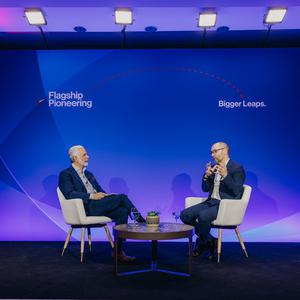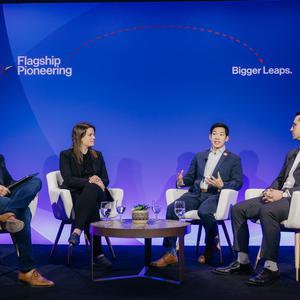Thirty entrepreneurial-minded scientists with training in oncology, immunology, infectious diseases, AI and ML, neuroscience, and other specialties were selected from more than 700 applicants to take part in this year’s Flagship Fellowship. Over the summer, the 2022 Class worked hand-in-hand with Flagship’s origination teams to explore the white spaces of human health and sustainability, using their own instincts and creativity to generate novel scientific concepts that challenge existing dogma. We tracked down some of these budding innovators to find out how they’ve changed and what they’ve learned.

Summer Fellows told us how Flagship’s unique approach to creating innovative companies has changed them as scientists and what they’ve learned about the role of imagination.
How has your time as a Flagship Fellow informed how you think about science?

Erica Normandin
PhD, expected 2022
Harvard University
Coming to Flagship has reinvigorated my passion for science. It's such a pleasure to have the opportunity to just think and talk about cool biology that has the potential to make a huge impact on human health and sustainability.

Jack Kirsch
PhD, expected 2023
Boston University
Never before have I been encouraged to act as the intellectual newcomer. All throughout academia, the sentiment is to demonstrate mastery and prowess. The fellowship has begun to teach me the power of being a naive actor; being comfortable with the truly uncomfortable feeling of not-knowing, but not letting that get in the way of bold thinking. The fellowship has helped me to add a whole new toolkit to my view of scientific thinking.

Ikenna Okafor
PhD, expected 2022
Johns Hopkins University
My time as a Flagship Fellow has informed the breadth of science that I think about. It also helped make me think about the commercial implications of discoveries when I read a new paper.

Oscar Marshall
PhD, expected 2023
Imperial College London
I think that it is safe to say that this summer has completely revolutionized the way that I think about science. Prior to joining the fellowship, the approach that was instilled in me during my studies and professional life was constrained by the data available and by adjacencies between closely related fields. Flagship takes a totally different approach. The fellowship has provided a stable platform from which to generate and iterate on creative ideas, whilst still demanding evidence to support these ideas. It has taught me to connect dots between apparently distinct and unrelated scientific areas.

Trenton Piepergerdes
PhD, expected 2022
Rice University
My time as a Flagship Fellow has first and foremost reinvigorated my love for science. Over grad school, I found myself bogged down in the weeds of my project, nervous I had lost my passion for all things biology and medicine. The uninhibited exploration process and optimistic creativity inherent in Flagship's model has reminded me how absolutely cool science is and how we can contribute to medical therapies in meaningful ways.

Timothy Welsh
PhD, expected 2023
University of Cambridge
My time as a Fellow has made me rethink how I approach the concept of expertise and the self-imposed constraints that come with it. Getting thrown into fields far away from my own and quickly gaining footing has shown me that there are persistent themes throughout science that are transferable across fields, and often all that is needed to approach a new area of science is a proper mindset balancing open-mindedness and critical scrutiny.
What is the role of imagination in entrepreneurial science?

Erika Gonzalez
MD-PhD, expected 2022
Ludwig Maximilian University
Imagination is critical to pushing boundaries. Imagination in the sense of coming up with disruptive ideas and solutions nobody thought of before, and imagination to create teams with people with different backgrounds, races, experiences, etc.

Grigori Guitchounts
PhD
Harvard
Imagination is everything! Without imagination, science would be limited to what currently exists. Imagination drives our ability to innovate: it's like the fuel that allows us to explore new places.

Cristina Jauset
PhD, expected 2022
University of Cambridge
Imagination is key to innovation. Dreaming of ideal, likely impossible, futures can help us identify the products and technologies that would solve current unmet needs. By drawing back from these hypothetical futures to our current present we can identify what scientific innovation would be needed to turn them into a reality.

Chong Guo
PhD
Harvard
Imagination grants a temporary license to re-evaluate a shared, often dogmatic, understanding of the world in a way that better benefits us. It's hugely important for value creation and fundamental discoveries in science.

Kate Harline
PhD, expected 2022
Cornell University
Imagination is what converts an observation to a finding. Novelty without the context of imagination is just noise. I've enjoyed learning in the program how to discover true novelty and what to discard as noise.

David Haggerty
PhD, expected 2022
Harvard University
There is no entrepreneurial science, or innovation in science, without imagination. My time as a fellow has further solidified that we must use our imaginations first to dream up what may look like science fiction to most, but then use our skillset and training as scientists to turn those ideas into reality.
If you see an error in this story, contact us.





